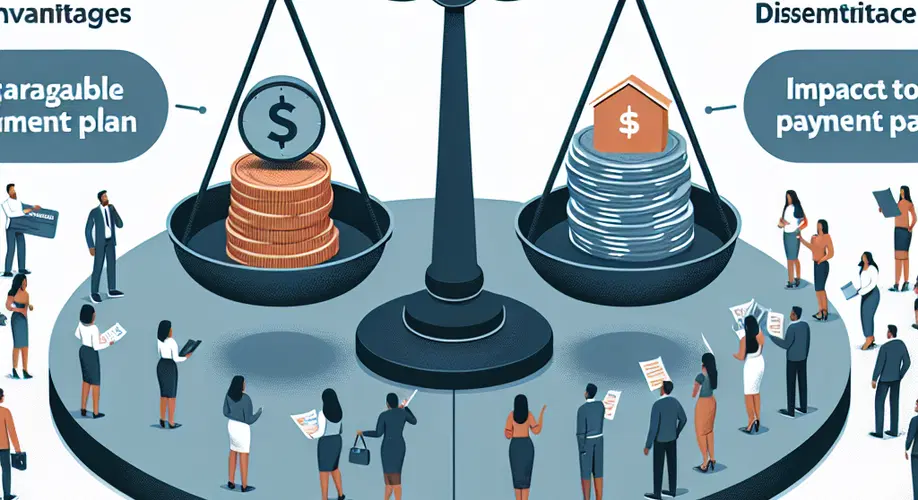Are you looking for DEBT RELIEF answers? Call toll-free 866-250-6599

Navigating the Pros and Cons of Accredited Debt Relief Services
Accredited debt relief services offer a lifeline to those burdened by substantial debt, yet understanding their advantages and disadvantages is crucial before plunging into commitments. On the upside, these services can consolidate multiple debts into a single monthly payment, potentially reducing interest rates and facilitating a more manageable financial situation. However, the downside includes the possibility of incurring fees that could diminish savings and the risk of scams from non-accredited agencies. Thus, meticulous research and selection of a reputable service provider are indispensable steps to safeguard one's financial future.
The pursuit of debt relief has direct implications on an individual's credit health and capacity for personal finance management. Adopting an accredited program can lead to an initial drop in credit score, as lenders may view the involvement of a third party in managing debts as a red flag. Nevertheless, consistent adherence to a structured payment plan can gradually rebuild credit standing, demonstrating to potential lenders a commitment to fiscal responsibility. It is, therefore, imperative to weigh the short-term impact against the long-term benefits of engaging with a debt relief service.
Facing a spectrum of debt solutions, consumers often find themselves weighing debt settlement, management plans, and non-profit credit counsellors. Debt settlement aims to negotiate a reduction in the owed amount, providing significant relief but potentially harming credit profiles. In contrast, debt management plans organize debts without reducing the principal, which might be a slower but steadier approach to freedom from debt. Non-profit credit solutions, offering advice and education, may serve as a supplement to these strategies by enhancing an individual's financial literacy and decision-making abilities.
The Impact of Debt Relief on Credit Health and Personal Finance
When considering accredited debt relief services as an alternative to bankruptcy, it's vital to understand their influence on one's credit health. Engaging in debt settlement or enrolling in a debt management plan can cause an initial dip in credit scores as creditors may report these actions. However, over time, the effect could potentially be less severe than the lasting impact of a bankruptcy, which remains on credit reports for up to 10 years. Effective personal finance management during this period can mitigate the negative effects and set the stage for credit score recovery.
Debt relief programs can significantly alter an individual's approach to personal finance management. By consolidating debts and reducing interest rates through debt management plans, individuals can regain control over their financial situation. This proactive management assists not only in relieving the immediate stress but also helps plan for a stable financial future, often without the stigma associated with bankruptcy. Proper utilization of these credit relief programs can lead to improved financial literacy and better budgeting habits.
It's important to compare all available debt relief options before making a decision. Debt settlement programs may offer a quicker resolution but potentially at the cost of a more pronounced credit score drop. In contrast, debt management plans often involve working with creditors to set up more manageable repayment terms, which may protect creditworthiness to a greater extent. Non-profit credit solutions provide another avenue, offering counseling and education that empower individuals to make informed decisions about their fiscal health without directly impacting credit scores.
Evaluating Debt Settlement vs. Management Plans vs. Non-Profit Solutions
Evaluating different debt relief solutions can be compared to finding the right key for a lock - not all options will fit your financial situation. Debt settlement is often seen as a drastic measure, suitable for those with substantial debt who may be trying to avoid bankruptcy. However, it can lead to significant credit score damage as it often involves stopping payments to creditors. Contrarily, debt management plans, advised by credit counselors, are structured to pay the debt in full but with reduced interest rates or waived fees, making it a milder hit to your credit report. Finally, non-profit credit solutions could provide the much-needed advice and structure without high costs, particularly for those with smaller debts or looking for budgeting assistance.
Navigating the Pros and Cons of Accredited Debt Relief Services requires a clear understanding of your financial circumstances and long-term goals. Such services can offer immediate relief by negotiating with creditors to potentially lower your debt amounts or restructure payment terms. On the flip side, it is important to scrutinize the credentials and success rates of these agencies, as not all are created equal. Additionally, there may be fees that, if not managed properly, could offset the financial relief provided. Transparency and a solid track record are essential features to look for in an accredited debt relief provider.
The Impact of Debt Relief on Credit Health and Personal Finance cannot be overstated. Engaging in a debt relief program may initially lower your credit score as your payment patterns change and creditors report settlements. However, successful completion of a debt relief plan could potentially mean fewer debts and a more manageable financial portfolio. It's critical to weigh the immediate impact against the long-term benefits of being debt-free. A thorough analysis and consultation with financial advisors can help determine the most beneficial path forward.









